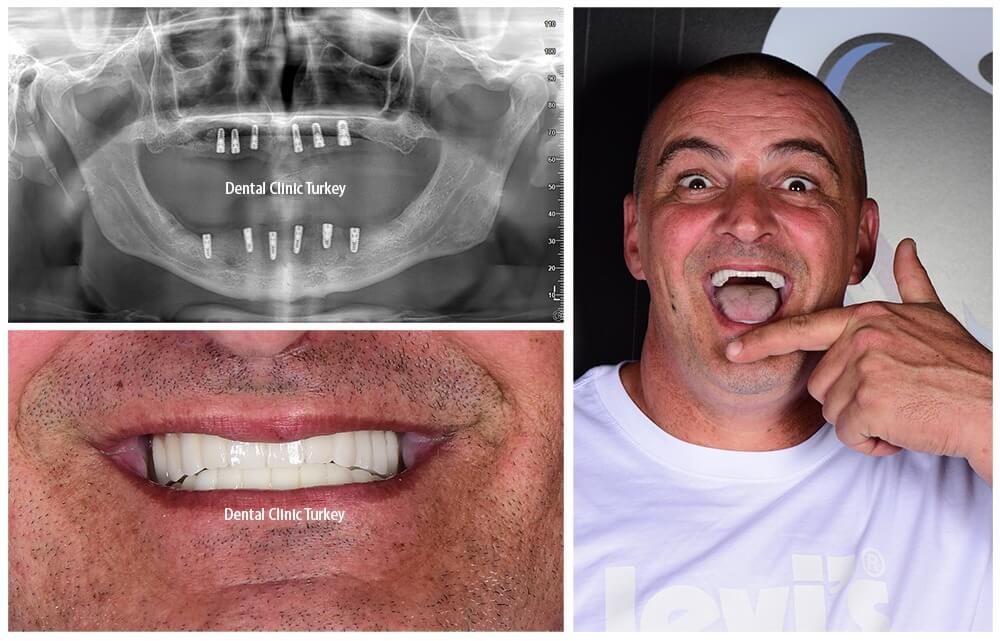
Dental Implant
How is a dental implant applied?
The specialist dentist determines whether the patient is suitable for implant treatment. If the measurements show that the bone structure is suitable for implant treatment, the application phase begins.
If the bone structure and gums are not in a position to carry the implant, additional bone surgery can be applied.
Implants are placed into the bone by a dentist under local anesthesia with a minor surgical operation. After this procedure, it takes an average of 2–4 months for the implant to fuse with the jawbone. In cases where the bone level is sufficient and there is no inflammatory condition, the implant can be placed in the area on the same day, immediately after the tooth is extracted.
During this period, the implant gains real tooth root function. In the final stage, the prosthesis is placed on the new tooth root consisting of implants, and the treatment is complete.
What are the advantages of implant treatment?
While the missing tooth or teeth are being completed, the adjacent teeth that are healthy are not touched. There is no cutting of healthy teeth.
It provides full efficiency both aesthetically and functionally. The person to whom the treatment is applied regains chewing function and has an aesthetic appearance.
Implants do not feel like excess in the mouth. It looks and feels like real teeth.
It is extremely durable. It can be used for many years, even a lifetime, if proper oral and dental care is provided.
In which situations is the implant applied?
In cases of single or multiple missing teeth, as well as complete tooth deficiency due to trauma, decay, or gingival disorders,
In cases where a fixed prosthesis cannot be applied, it is used to prevent the existing prosthesis from moving in the mouth.
What is done in the dental implant process? What are the implant stages?
The treatment process for dental implants consists of various specialists, primarily an oral and maxillofacial surgeon, who is a dentist who specializes in the treatment of structures that support the teeth, such as the gums and bones.
Because dental implants require one or more surgical operations, a thorough evaluation, including the following, is required to prepare for the procedure.
Comprehensive dental examination: Panoramic ental X-rays and 3D images are taken, and models of your teeth and jaw are designed.
Reviewing your medical history: You should inform your doctor about any prescription or over-the-counter medications and/or supplements you take. If you have chronic heart disease or orthopedic implants, your doctor may recommend taking antibiotics before surgery to prevent infection.
Treatment plan: This plan, which is tailored to your specific situation, takes into account factors such as how many teeth you need and the condition of your jawbone and remaining teeth.
In order to provide pain control, anesthesia options during the operation include local anesthesia, general anesthesia, or sedation. The most suitable option for you will be evaluated by your doctor.
Your dental care team will provide you with a list of what to eat or drink before surgery, depending on what type of anesthesia will be administered. If sedation or general anesthesia is administered, someone will need to drive you home after the operation, and it is recommended that you rest at home.
Dental implant surgery is an outpatient surgery that is usually done in stages. The process of placing a dental implant involves many steps, including:
- Damaged tooth extraction
- When necessary, preparation of the jawbone (grafting),
- Dental implant placement,
- Bone growth and healing
- Placement of an artificial tooth.
This process can take months. Most of the time will be spent waiting for the new bone in the jaw to grow and heal. Depending on your situation, the special treatments performed, or the materials used, some steps can sometimes be combined.
Call now and let our expert team plan all our implant solutions for you.
Frequently Asked Questions
Ordinary oral hygiene and dental care should be done without neglect. In addition, food residues accumulating around the implants after meals should be cleaned using dental floss, if necessary. If it is not done, inflammation may occur around the implant. In the event of tartar formation around the prosthetic teeth placed on the implant, bone resorption and gingival recession may occur in the long term. This causes implant loss.
Local anesthesia is applied before the implant treatment. Therefore, the patient does not feel any pain during the operation. After the effect of the anesthesia wears off, mild pain may occur for a short time.
If the specialist dentist decides that the patient’s bone structure is not suitable for the implant as a result of the examinations he has made, he may intervene with bone surgery so that the treatment does not fail. The success rate of implant treatments performed today has been determined at 96 percent.
Implant treatment can be applied to anyone who has a missing tooth and whose bone structure is suitable for treatment.
Although it varies depending on bone structure and infection, implant placement can usually be done on the same day as tooth extraction.
In order for the implant application to be lifelong, bone development must be completed. For this reason, the age of 18 was determined as the lower limit. However, there is no upper limit. Implant treatment can also be applied to elderly patients.
In cases where bone surgery is not required, there is a waiting period of 2-4 months after the implants are placed. After the period is completed, the prosthesis is applied within an average of one week.
Yes. Implants are used to replace a single missing tooth, several missing teeth, or all missing teeth.
After the operation, nothing should be eaten for at least 2 hours. It is recommended that the patient be fed soft foods as much as possible for the next week. It is also necessary to avoid eating foods that are very hot or contain sharp spices until the wounds heal.
